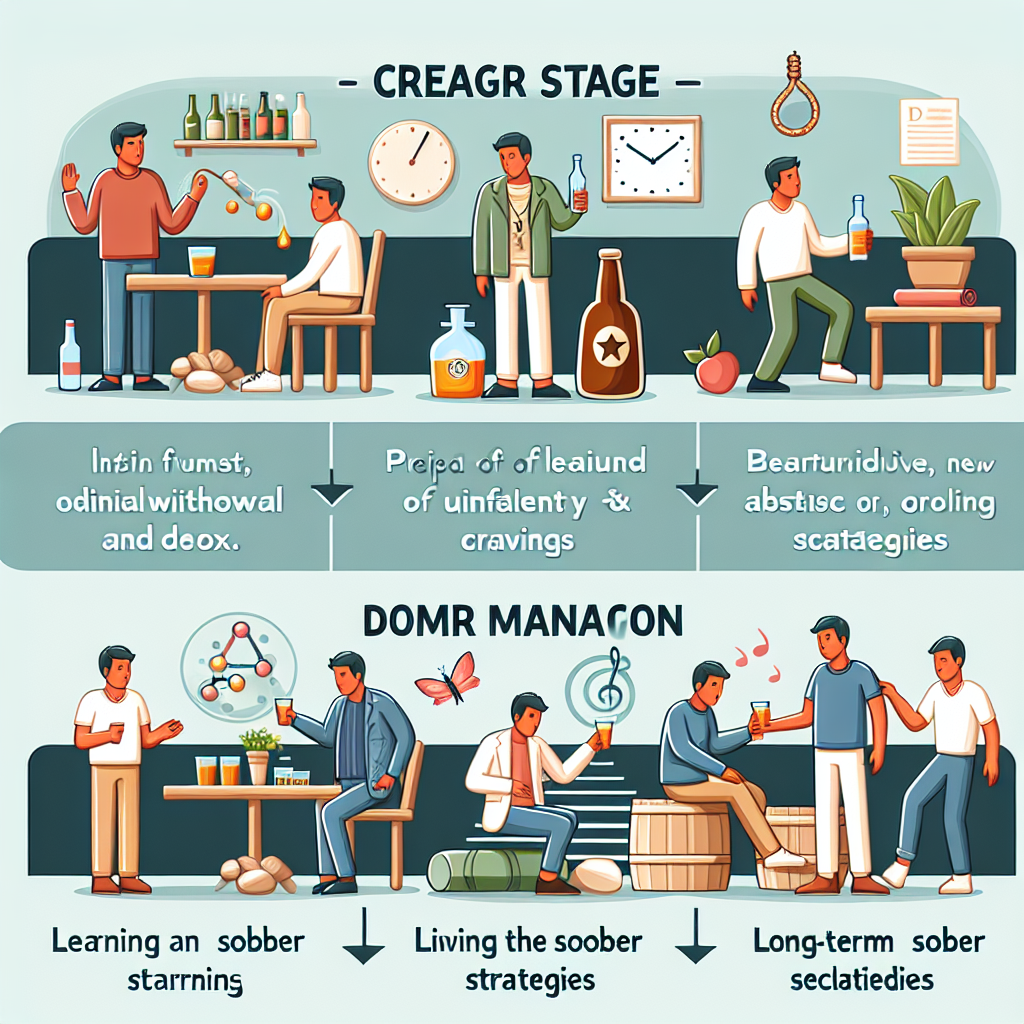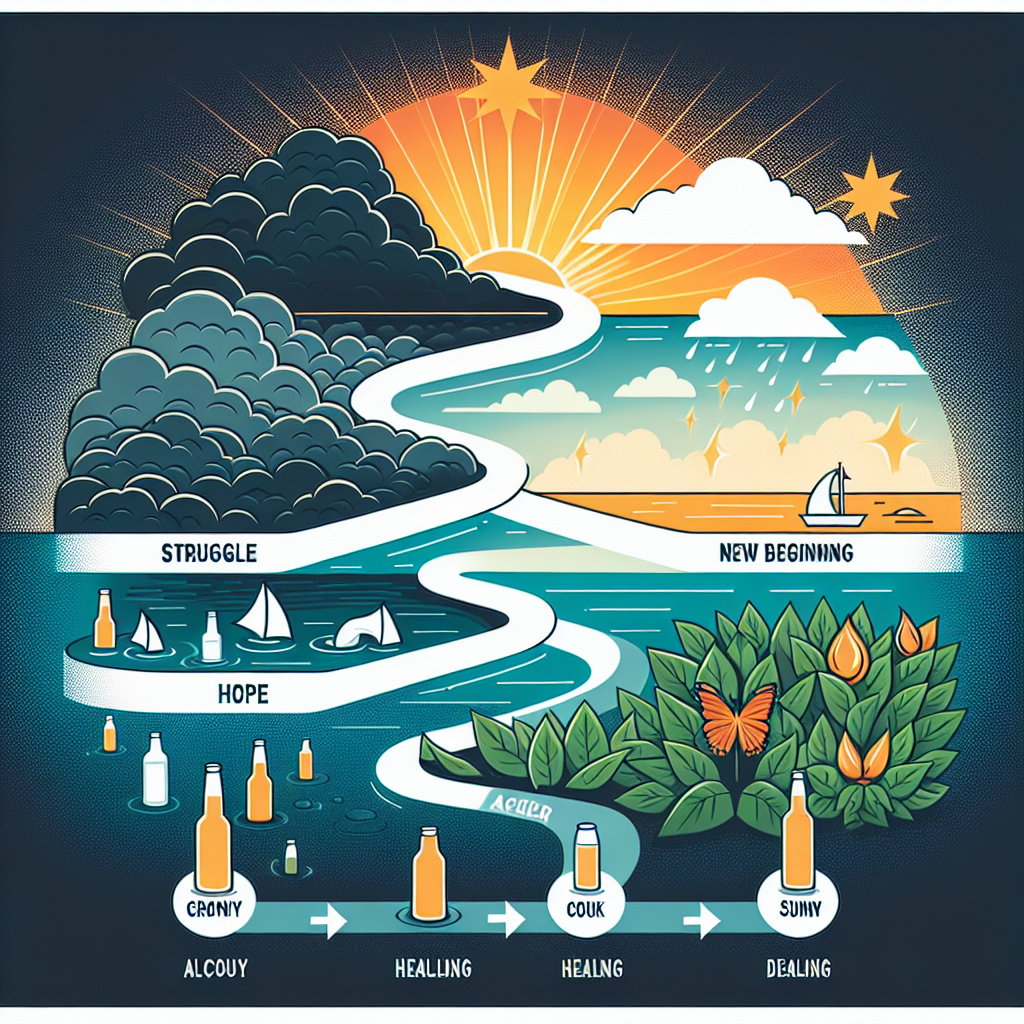-
Table of Contents

“Navigating the Path: Understanding the Challenges and Triumphs of Alcohol Addiction Recovery”
Introduction
Alcohol addiction recovery typically involves several stages, each with its own set of challenges and milestones. In the initial stage, known as detoxification, individuals may experience withdrawal symptoms such as anxiety, tremors, and nausea as their bodies adjust to the absence of alcohol. This phase often requires medical supervision to ensure safety and manage symptoms. Following detox, the early abstinence stage focuses on maintaining sobriety, developing coping strategies, and addressing psychological dependence. This period can be marked by intense cravings and emotional fluctuations. The middle stage of recovery emphasizes building a new, alcohol-free lifestyle, which includes forming healthy habits, repairing relationships, and finding new sources of fulfillment. Long-term maintenance is the final stage, where the focus shifts to sustaining sobriety, preventing relapse, and continuing personal growth. Throughout all stages, support from therapy, support groups, and loved ones plays a crucial role in achieving and maintaining recovery.
Understanding The Early Stages Of Alcohol Addiction Recovery: What To Expect
Embarking on the journey of alcohol addiction recovery is a courageous and transformative decision. Understanding what to expect during the early stages can help prepare you for the challenges and triumphs that lie ahead. The initial phase of recovery is often marked by a mix of emotions, physical changes, and the need for a strong support system. As you take your first steps, it is essential to recognize that recovery is a gradual process, and each stage brings its own set of experiences and milestones.
In the earliest days of recovery, you may experience withdrawal symptoms as your body begins to detoxify from alcohol. These symptoms can range from mild to severe and may include anxiety, tremors, sweating, nausea, and insomnia. It is crucial to seek medical supervision during this period to ensure your safety and well-being. Medical professionals can provide medications and support to help manage withdrawal symptoms, making the process more bearable.
As you move past the initial detox phase, you will likely encounter a period of emotional turbulence. This stage is often characterized by feelings of guilt, shame, and regret over past behaviors. It is important to remember that these emotions are a natural part of the healing process. Engaging in therapy or counseling can be incredibly beneficial during this time, as it provides a safe space to explore and address these feelings. Cognitive-behavioral therapy (CBT) and other therapeutic approaches can help you develop healthier coping mechanisms and build resilience.
During the early stages of recovery, establishing a strong support network is vital. Surrounding yourself with understanding and supportive individuals can make a significant difference in your journey. This network may include family members, friends, support groups, and healthcare professionals. Attending support group meetings, such as Alcoholics Anonymous (AA), can provide a sense of community and shared experience, helping you feel less isolated in your recovery.
As you continue to progress, you may begin to experience a renewed sense of hope and motivation. Setting short-term and long-term goals can help you stay focused and committed to your recovery. These goals might include improving physical health, rebuilding relationships, pursuing education or career opportunities, and engaging in hobbies and activities that bring you joy. Celebrating small victories along the way can boost your confidence and reinforce your commitment to a sober lifestyle.
It is also important to be mindful of potential triggers and high-risk situations that could lead to relapse. Developing a relapse prevention plan with the help of a therapist or counselor can equip you with strategies to navigate these challenges. This plan might include identifying triggers, creating a list of coping strategies, and establishing a support system to reach out to in times of need.
Throughout the early stages of alcohol addiction recovery, self-care plays a crucial role. Prioritizing your physical, emotional, and mental well-being can enhance your overall recovery experience. This might involve adopting a balanced diet, engaging in regular physical activity, practicing mindfulness or meditation, and ensuring adequate rest and relaxation.
In conclusion, the early stages of alcohol addiction recovery are a time of significant change and growth. While the journey may be challenging, it is also filled with opportunities for healing and self-discovery. By understanding what to expect and embracing the support available to you, you can navigate this transformative process with resilience and hope. Remember, recovery is a journey, not a destination, and each step forward is a testament to your strength and determination.
Navigating The Later Stages Of Alcohol Addiction Recovery: Key Milestones And Challenges
Navigating the later stages of alcohol addiction recovery can be both a challenging and rewarding journey. As individuals progress through these stages, they often encounter key milestones that signify growth and resilience. Understanding what to expect during these phases can provide clarity and motivation, helping to maintain focus on long-term sobriety.
One of the first significant milestones in the later stages of recovery is achieving sustained abstinence. By this point, individuals have typically maintained sobriety for an extended period, often several months to a year. This stage is marked by a growing sense of stability and confidence in one’s ability to live without alcohol. However, it is essential to remain vigilant, as the risk of relapse can still be present. Developing a robust support network, including friends, family, and support groups, can be instrumental in maintaining this newfound stability.
As individuals continue to navigate their recovery, they often experience a deepening sense of self-awareness and personal growth. This stage involves reflecting on past behaviors and understanding the underlying causes of addiction. Through therapy and self-exploration, individuals can identify and address unresolved emotional issues, trauma, or mental health conditions that may have contributed to their addiction. This process can be both challenging and liberating, as it allows individuals to gain a clearer understanding of themselves and their motivations.
Another key milestone in the later stages of recovery is rebuilding relationships and establishing healthy connections. Addiction often strains or damages relationships with loved ones, and repairing these bonds can be a crucial aspect of the recovery process. This stage involves open communication, forgiveness, and the willingness to make amends. By fostering healthy relationships, individuals can create a supportive environment that encourages continued sobriety and personal growth.
In addition to repairing relationships, individuals in the later stages of recovery often focus on building a fulfilling and balanced life. This may involve pursuing new hobbies, setting career goals, or engaging in volunteer work. By finding purpose and meaning in their daily lives, individuals can create a sense of fulfillment that supports their ongoing recovery. It is important to remember that this stage is not about perfection but rather about progress and finding joy in the journey.
Despite the many positive changes that occur during the later stages of recovery, individuals may still face challenges and setbacks. It is crucial to recognize that recovery is a lifelong process, and occasional difficulties are a natural part of the journey. Developing healthy coping mechanisms and strategies for managing stress can help individuals navigate these challenges without resorting to alcohol. Mindfulness practices, such as meditation and yoga, can be particularly beneficial in maintaining emotional balance and resilience.
As individuals continue to progress in their recovery, they may also find themselves in a position to give back to others who are struggling with addiction. Becoming a mentor or sponsor in a support group can provide a sense of purpose and reinforce one’s commitment to sobriety. By sharing their experiences and offering guidance, individuals can inspire others and contribute to a supportive recovery community.
In conclusion, navigating the later stages of alcohol addiction recovery involves achieving sustained abstinence, deepening self-awareness, rebuilding relationships, and creating a fulfilling life. While challenges and setbacks may arise, developing healthy coping mechanisms and maintaining a strong support network can help individuals stay on track. By embracing personal growth and giving back to others, individuals can find inspiration and purpose in their ongoing journey toward long-term sobriety.
Q&A
1. **Detoxification Stage:**
– Expect withdrawal symptoms such as anxiety, tremors, sweating, nausea, and in severe cases, seizures. Medical supervision is often recommended to manage these symptoms safely.
2. **Rehabilitation Stage:**
– Expect to participate in therapy sessions, both individual and group, to address underlying issues and develop coping strategies. This stage often includes education about addiction, relapse prevention planning, and building a support network.
Conclusion
During the different stages of alcohol addiction recovery, you can expect the following:
1. **Detoxification**: This initial stage involves the body clearing itself of alcohol, often accompanied by withdrawal symptoms such as anxiety, tremors, sweating, nausea, and in severe cases, seizures or delirium tremens. Medical supervision is often necessary.
2. **Early Abstinence**: This stage focuses on maintaining sobriety and coping with cravings, triggers, and psychological dependence. It often involves therapy, support groups, and developing new coping mechanisms.
3. **Middle Recovery**: During this stage, individuals work on repairing relationships, building a new lifestyle, and addressing underlying issues that contributed to addiction. Continued therapy and support are crucial.
4. **Long-Term Recovery**: This stage involves maintaining long-term sobriety, preventing relapse, and continuing personal growth. It often includes ongoing participation in support groups, therapy, and a commitment to a healthy lifestyle.
In conclusion, alcohol addiction recovery is a multi-stage process that begins with detoxification and progresses through early abstinence, middle recovery, and long-term recovery. Each stage presents unique challenges and requires different strategies and support systems to achieve and maintain sobriety.



